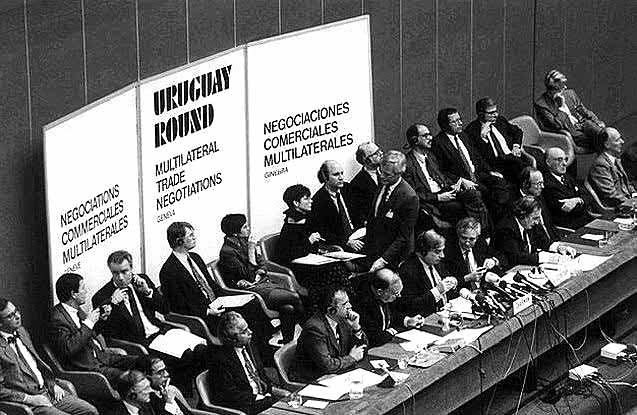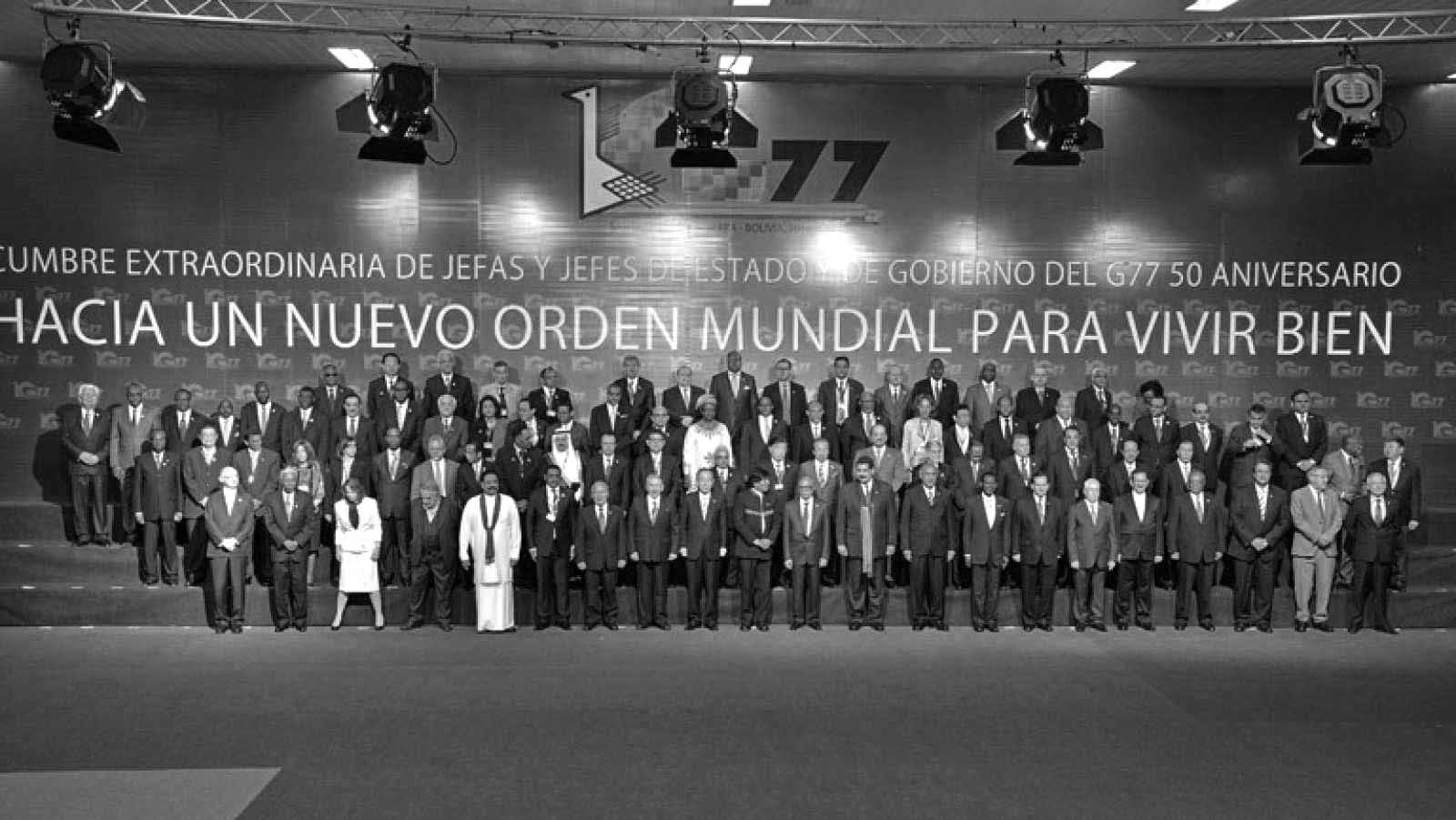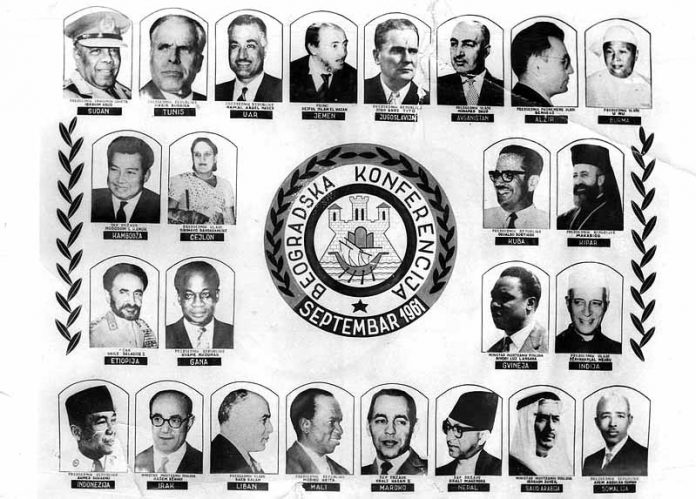Speech by Mwalimu Julius K. Nyerere, Chairman of the South Commission (South Center), At the Summit of the Non Aligned Conference in Belgrade: 4, September 1989
…. Almost all Southern countries are in deep economic and social crisis, emerging in large part from the global economic hostility and the political environment in which we must live and do business.
Prices of important goods are constantly declining in real terms, many of us carry the burden of unsustainable debt service – and especially the unpaid, we are facing increased protection of the domestic commodity market from the north against our industrial products we sell there, The rapid development of Science and Technology continues to increase productivity and commercial benefits for developed and industrialized countries, economically, politically, even military action is taken by the North against individual Southern states.

These are the situations in which we now have to work and make our own decisions. And there is nothing in the Commission’s analysis to show otherwise that these conditions will be stable, there are many indications that the global economic environment will continue to deteriorate.
So the work of the South, and in the future will continue to work, under great atmosphere of danger. It is this economic risk that makes many countries or our countries vulnerable to all kinds of pressure from the North. We are forced to pay through threats to block loans, investments, or grants, or to block markets for our products. In these circumstances or real dependence our freedom of action – and that is the reality of our freedom – is badly impacted. Our response to this risk is highly important for the future.
The Commission has therefore embarked on two fundamental areas: first, all Southern countries recognize that dependence is not in line with our independence and the free resolution of our own policies. Second, the South must have a strategy to eliminate such dependence while promoting the region‘s sustainable development. From these two areas we have reached four basic conclusions, and we are now addressing their implications.
1. The only people responsible for the development of the South and the independence of the South are the Government and the people of the South.
2. Sustainable development in independence must be based on national self reliance.
3. Southern countries must have independent unity if they want to increase their ability to continue in being in the status of independence.
4. If Southern countries want to gain influence over the international economic system they must work together and in solidarity in their trade with the North.
Gentlemen: These conclusions seem simple and clear. That is not surprising, the basic truth is rarely confusing or difficult, but these simple conclusions will not be easy to put into practice. Building independent and Southern states, and gaining some influence in the global economic environment, will be a long process that is tough. It will be one that requires determination of intentions, purposeful planning, full participation of our people, adversity and self-sacrifice. But it will be a crisis and a self-sacrifice with a sense of dignity: the independence of our countries and our people. And there will be hope to end the problem and making sacrifices.
Now all together, one by one, our people are always encouraged to tighten their belts, ‘reform’ themselves, and make sacrifices. And for what purpose? So that North Banks can adjust their accounts and make a profit. There will be no end to that kind of victimization.
National self reliance requires that each country make the most of its domestic potential for development. It means aligning our internal economic and social structures in order to make full use of our resources with skilled and unskilled people, our material resources, our financial resources, and our traditional cultures of cooperation for production and mutual support. together. It means creating our development plans with a single goal. It means looking economically, socially, and culturally, internally before looking outwards.
Joint self-reliance means looking at other Southern countries and finding a cure for sanctions that limit our national ability to use our resources to the highest extent. For example: every year we pay North American billions of dollars in the form of consulting and management fees. But the South has expertise that can serve the South: there is very little need to go North. Why do we do that? And every year we spend billions of dollars sending our students for training in the North. But the South has the capacity for training that can better serve the South because it is applicable to the needs of the South, why should we go North for less useful training?
And Joint Self reliance means working together with other Southern countries, regional to regional, or sub regional, Regional or International levels as long as it is feasible, but always with the aim of increasing our collective capacity for the development of independence.
Joint self-reliance, however, requires deliberate determination and deliberate action and prioritization in our relations with the outside world, and it also requires giving higher priority and more assistance to organizations and partnerships that we have already placed at different levels. It means looking south before looking north.
But we cannot deceive ourselves that the North does not exist. It is there. It is powerful and makes decisions that affect the South. The North Economy Markets enhances their strengths which are already great by meeting regularly and before all major international

conferences, coordinating their activities and planning their partnerships, organizing themselves in the OECD and in other ways. In their business dealings with the South they embrace cohesive discipline, and use the strategy of ‘divide and rule’ to achieve their goals. They therefore control the world economy, and use their institutions to promote their own interests.
The world is one, technologically, economically, and environmentally. We in the South need to work with the North – both North-West, and North-East. But in order to do so, we must realize that all parts of the North, and their constitutional states will pursue their own interests, No one will address our problems if that is not in any way helpful to them. They are united in this purpose.
We must do the same. Looking at our own experience for the past thirty years, we can see that the governments or the North responds when there is a collective and organized force set up as counter strategy rather than appeals. Appeals are feasible in humanitarian aid or promises to temporarily alleviate of existing issues. Appeals did not come and will not lead to any fundamental changes in those structures of the global economy and finance that lead to an increase of our core problems.
We in the south must agree to adopt a cohesive strategy to address the plight of our hungry people. Northern practice teaches us every day, power is in unity. And the Mighty Instrument from the South is to have collective power; we have nothing else. Individually even the most powerful country in the South will not be strong in the face of the great joint economic mighty force of the North.
The potential for strengthening the South will depend only on planned and deliberate co-operation, co-ordination, solidarity, and unity in the implementation of all multilateral or bilateral trade agreements with the North. To achieve this South countries will have to accept the discipline of solidarity and unity and cooperation.
The South Center strongly believes that the basic strategy for achieving development and protecting our independence is to continue with the southern concept of self-reliance. In support of these two goals – development and independence – we must also force ourselves to stand together on all international questions. And we must establish our own plans on all international questions, not just the initiatives initiated by the North.
So, for example: the global debt problem is like a two-sided coin. The North challenges revolve around the lending banks and the so-called global financial system. These items are in the interest of the North to devise a debt strategy that addresses that particular problem. In doing so the North has been very successful, there has never been and there will be no bank failure.
But the South problem is debt itself and the transfer of resources from the poor south to the rich in the north. Why should we expect the North to devise a strategy to address the problem? It’s not their problem. It’s our problem. I repeat: the only people responsible for the development of the South are the Southern Governments and the Southern People. The South itself must collectively formulate a debt strategy that will end this massive and unjust transfer of resources from the poor South to the rich North; And then keep it North.
And the Uruguay Round is a true example of the North standing together in pursuit of the worst evil intentions against the development

prospects of the South. Non-cultural issues have been successfully included in the Agenda. The unsuspecting and fragmented South now finds that the North is using various institutions to establish a New International Economic System that serves its interests more effectively than the current one. And while in-depth and very difficult negotiations are underway, North countries are meeting day by day to agree on their positions. No such coordination is taking place in the South, when our mediators are trying to coordinate and balance themselves in their respective positions and receive different directions from their national headquarters. This division within the South is a gift to those countries or the North who are eager to provide aid and exploit the South in pursuit of their economic interests.
Again OPEC represents a major and unique attempt made by manufacturers of primary products from the South to influence prices through management of supply. Cocoa and coffee producers have failed to eliminate their differences in their pre-negotiated meetings with buyers, the results can be seen in current prices – which all producers suffer from. And even with many other products where small efforts have been made together to influence supply or price, instead, we all try to produce more and more even though demand has dropped: we have to work together to get fair prices and be profitable, no matter the challenges in achieving that.
And the Seventy-Seven group took a big step towards arranging a joint Southern position in relation to International Organizations. But we have given up. However if we think it is necessary to have an International Code of Conduct governing the activities of these Organizations in our countries, then we in the South must agree on such principles and apply them. We should not wait for developed countries to ratify the decision we are making together, the current jungle law on this issue is in the best interests of the North, so it is usually difficult to call for a ‘Code’. We have to decide among ourselves on a common position that is in a different context to the satisfaction of the host country and the investor – and then they all stand together in implementing the agreement we have reached.
And finally, the North responds to the importance of accelerating Environmental Protection by making their recommendations, these are usually based on their own priorities. They convene meetings, attend and discuss the agendas set by the North – which do not include development. Why not work on the Southern Agenda for a global environmental dialogue, which links the key battles to poverty and weak development? Working together as the South, we can participate fully to protect the future of the world as we continue to refuse to compensate for the environmental damage that the North has already done to us, or to sacrifice the development of our people in the North’s interests.
Mr. Chairperson, only the Southern countries are responsible for development in the south. We must control our own future, despite the difficulty of doing so, and in spite of the inevitable differences and conflicts among us. And we can determine our own future. Working together. Together we can achieve the ability to determine our own policies, together we can establish our own plans on these and other issues. We do not seek unity as an instrument of domination over others. We seek unity as a tool to liberate ourselves, and to oppose those who rule us. Chairman, The Non Aligned Movement will never forget that imperialism is not dead.
The desire to work together has always been present in the South, and this is illustrated with concrete examples such as the activeness of the Non aligned movement, of the group of 77, and a couple of Regional and Sub-Regional organizations for cooperation. But we have not done enough to liberate any struggle, the Union must be effective. There must be a careful Union to increase the strength of each component, and the effectiveness of co-ordination in order to increase strength. And in doing so we are reluctant to accept Union discipline and or to work together. We do not follow the logic of working together.
Thus, we usually do not have a national mechanism to integrate collective agreements into a joint national action plan, collective decisions reached, after serious negotiations, are often not implemented. The self reliance of the Southern Coalition which we avoid politically, lacks the support of the South-South Co-operation Coalition. The status of the required National Unity will vary, depending on the nature of the relevant structures of our governments. But in all cases there is a need for structures and programs that involve the people as a whole, the bureaucracy, and the entire political system in the collective struggle of the South.

Furthermore, while the Group of 77 and the Non Aligned Movement are working hard to present our common interests, they remain relevant to specific issues only and when necessary. Effectively, the Union is almost non-existing when there are no meetings. Although its supervisors are striving to promote the life of this union, there is no mechanism to make their efforts effective or to assist them in implementing the decisions or meeting resolutions.
Gentlemen, these shocking plans may have been enough in the past ~ I’m not sure. But it will not be enough for the tasks that will confront us in this decade or century. Our systems need to be strengthened if you want them to work effectively in the current economic and political dialogue. For secular politics, it is now economic politics. If we plan to make use of our shared resources and collective strengths we can be more effective in complex and in-depth economic dialogue that is taking place at all times and which is crucial to our future development prospects.
Chairman, The South Center’s Report will be published next year. Analysis will be available. An independent strategy will be questioned and recommended. It is our hope that practical recommendations for the implementation of the strategy and development of our people and ideas will also be found in it. But although, of course, our Report will take a lot of pages, and go into certain specific questions, but the basic message will be very simple. Let’s work together. Let us build Independence, a nation that is independent and self-reliant together.
However, the Commission does not have significant powers. Whether action will be taken in the Report will depend on the decisions of the governments and the people of the South. It will depend on whether they decide to organize themselves for national self-reliant development, collectively, and for commercial and negotiations with the North.
There is one small way in which the Commission can assist in this important work. We will complete our work next year and dismiss the Commission. But we are discussing the possibility of leaving creating an independent Secretariat which will be left behind, organized in the form of our own Commission, and with a few internationally respected people from the South as Trustees. Its purpose will be to fulfill the Commission’s goals of helping the South to strengthen its independence and self reliance, and its ability to negotiate with the rest of the world. Whether it is possible and how we will implement this idea depends on whether enough countries and the Southern Union feels it will be necessary and on our further focus on operational and financial issues if such a proposal is involved.
Chairman, Gentlemen and brothers. For the good of getting independence of our countries and the development of our people, please Work Together.
Thank you.
For more Nyerere speeches click here!

































